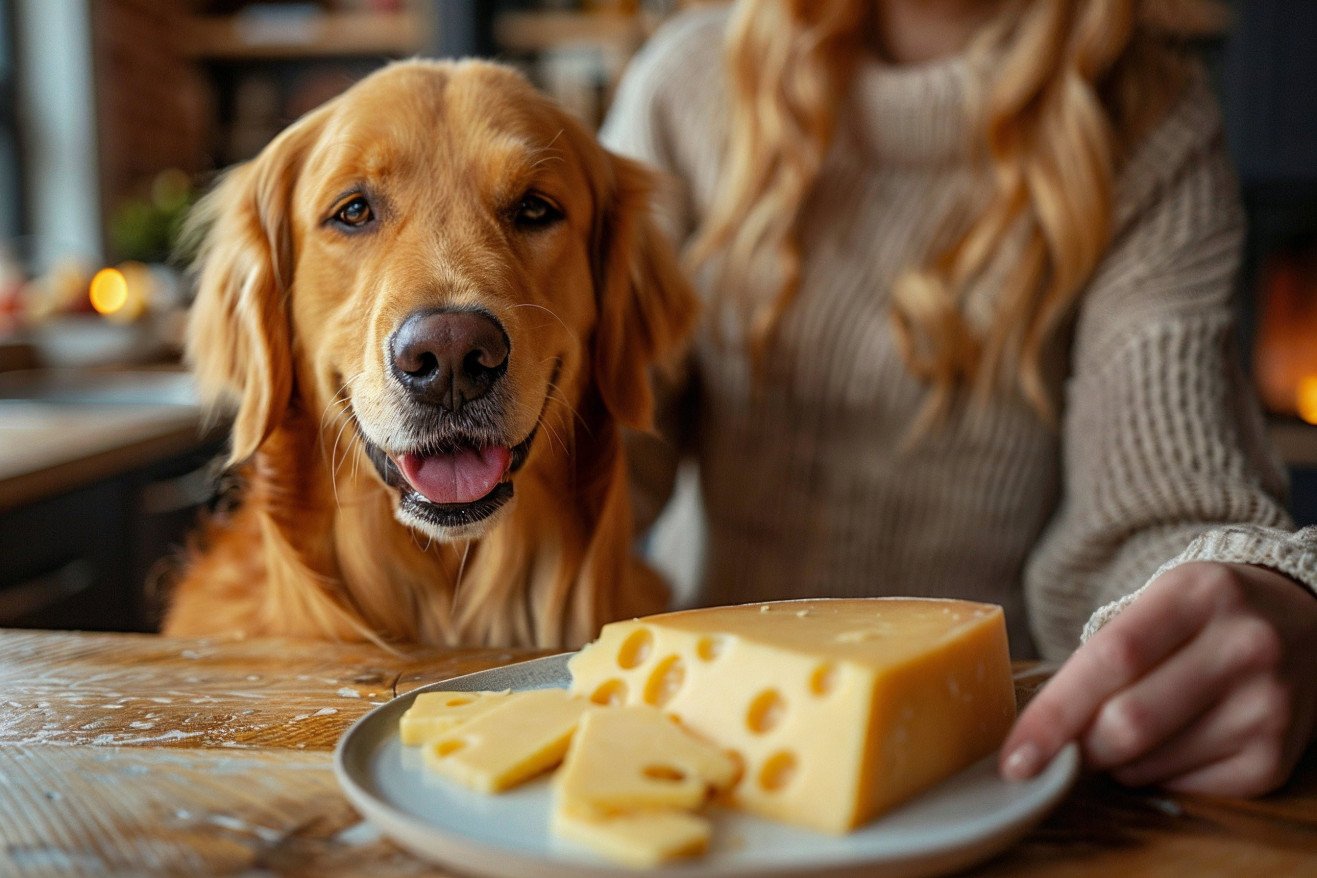Can Dogs Eat Swiss Cheese? What You Need to Know
16 April 2024 • Updated 16 April 2024

Your four-legged friend always seems to want to partake in the cheese board, but is it safe for dogs to eat Swiss cheese? While it should only be given to dogs in moderation, Swiss cheese can be a healthy addition to your dog's diet. It's high in protein, vitamin A, and calcium. However, it's also high in fat and salt, so it should be limited, especially for dogs that are overweight, have a history of pancreatitis, or are prone to bloat.
We'll take a look at the science behind the nutritional benefits and potential drawbacks of Swiss cheese for dogs. By examining the latest studies on the topic and the recommendations of veterinary professionals and animal nutritionists, you'll know whether or not this tasty food is good for your canine companion. Let's take a closer look at the evidence for and against sharing your Swiss cheese with your dog.
Can dogs eat Swiss cheese?
Nutritional Value of Swiss Cheese for Dogs
Swiss cheese is full of important nutrients that can be a great addition to your dog's diet when given in moderation. According to Kabo, a single ounce of Swiss cheese has 8 grams of protein, 270 milligrams of calcium, and 190 milligrams of phosphorus. As noted by FrankieLovesBarkery, this is the equivalent of a cup of milk's worth of calcium and about a third of a dog's daily phosphorus.
It also contains butyrate, a fatty acid that has been shown to have anti-cancer effects. According to DogChild, cheese can be a great, nutrient-dense, high-value reward for training, as it contains important vitamins and minerals. That said, it's important to remember that cheese is high in fat and calories, so it's important to make sure that your dog doesn't eat too much of it. Make sure to use it in moderation to ensure that your dog gets the most out of the nutrients that Swiss cheese has to offer.
Potential Dangers and Digestive Problems of Swiss Cheese
While there are some nutrients that dogs can get from Swiss cheese, there are also some potential dangers, especially for dogs that are lactose intolerant or have other health issues. According to WagWalking, lactose intolerance can cause diarrhea, constipation, and vomiting in dogs that have eaten Swiss cheese. Meanwhile, the high fat content can cause weight gain and even pancreatitis if dogs are given too much, according to FourLeafRover.
Dogs that are overweight or have kidney disease should avoid Swiss cheese because the high fat and salt content can make their health issues worse. As PetCareRx points out, the severity of the lactose reaction depends on the amount of lactose that the dog consumes, so dog owners should make sure to keep a close eye on their dog when they first start giving them Swiss cheese and call their vet if they notice any negative symptoms.
How Much Swiss Cheese Can Dogs Have?
As with all human foods, Swiss cheese should be given to dogs in moderation. According to Rested Paws, this means it should be an occasional treat rather than a regular part of a dog's diet. The site recommends a small serving, which it defines as a few bites or a couple of ounces, once a day. Meanwhile, PetMD suggests that treats, including cheese, should account for no more than 10% of a dog's daily caloric intake.
Puppies and dogs with sensitive stomachs may need to eat even smaller servings of Swiss cheese or avoid it altogether, according to PetFriendlyHumans. In general, dog owners should pay close attention to their pet's response to eating Swiss cheese and adjust their serving size and frequency as needed. However, as long as these recommendations are followed and individual differences are taken into account, Swiss cheese can be an occasional treat for dogs without causing any harm.
How to Transition Dogs to Swiss Cheese and Avoid Stomach Upset
If you want to start giving your dog Swiss cheese, you should start with small amounts and watch for any signs of stomach upset. As Rover.com points out, some dogs are lactose intolerant and can have symptoms like vomiting, diarrhea, and stomach pain if they eat dairy. If your dog handles the initial small amounts well, you can slowly increase the portion size from there.
To avoid potential issues, BullyStickscentral.com suggests picking low-fat, low-sodium types of Swiss cheese. You can also avoid giving your dog Swiss cheese on an empty stomach to help prevent stomach issues, according to BECOPets.com. Finally, make sure to give your dog plenty of water to help with digestion when you do give them Swiss cheese.
If you follow these tips and watch your dog's reaction, you can give them Swiss cheese as a special treat without any issues.
Conclusion: Moderation is Key for Dogs and Swiss Cheese
When given in moderation, Swiss cheese can be a healthy and safe snack for dogs. The MSPCA-Angell explains that pets can have allergic reactions to food, including cheese, and the symptoms can be mild to severe, so if a dog experiences symptoms like swelling, hives, or difficulty breathing, it's important to call a vet right away.
The Pawlicy Advisor explains that Swiss cheese has less lactose than other cheeses, but dogs can still be lactose intolerant. While it's generally safe in moderation, it's high in fat and sodium, so it should be limited, especially for dogs who are overweight, have high blood pressure, or have kidney problems. As with any new food, it's best to start with a small amount and see how the dog's body reacts to it.
In moderation, Swiss cheese can be a nutritious and safe snack for dogs. It offers valuable nutrients like protein and calcium, but it's also high in fat and salt. As a result, it's important for dog owners to monitor their pet's reaction and adjust portion sizes and frequency as needed. It's also a good idea to consult a vet, especially if your dog has health issues or sensitivities. With the right portion sizes and attention to individual needs, Swiss cheese can be an occasional treat for dogs.


